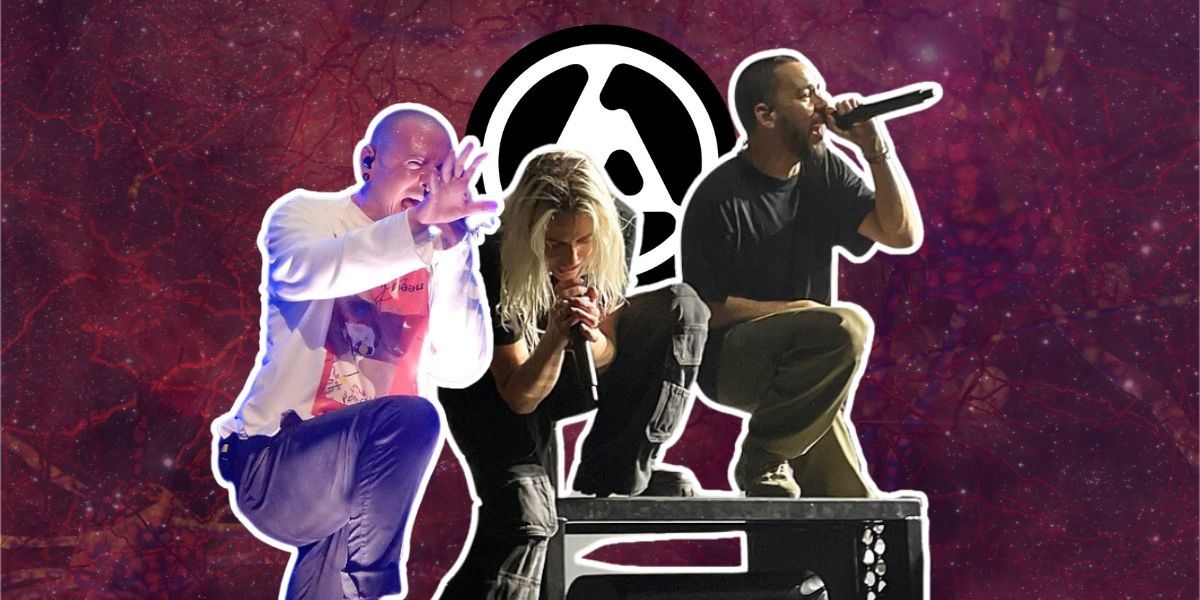Content Note:
This article discusses themes of depression, grief, and self-harm. If you’re in a vulnerable place right now, please feel free to skip this piece or come back to it when you feel ready.
If you’re struggling, please reach out to a mental health professional or contact a local support line.
Philosophy doesn’t always arrive dressed in robes or buried in ancient texts.
Sometimes, it screams through a microphone, or breaks in the voice of someone trying to hold it together.
Today, philosophy is everywhere. It hides in film, fiction, and in the lyrics of songs we grew up with.
That’s why I’m uncovering the hidden philosophies embedded in stories, characters, music, and media. Because it’s often found in the places we expect the least, but need them most.
For this first post of the series, I’m beginning with a band that never called itself philosophical, but became a lifeline for millions.
Linkin Park turned pain into poetry.
Gave the voiceless something louder than language.
And built a community out of grief and survival.
Many of their fans still carry the weight of what those songs represented.
And many still grieve, not just for Chester Bennington, but for the version of themselves their early lyrics once held together.
Let’s begin with a band that taught us how to scream and express the pain.
And what it means to survive the heavy silence after.
Xero to Linkin Park: In Search of a Voice
Linkin Park was first known as Xero, formed by Mike Shinoda, Rob Bourdon, Brad Delson, Joe Hahn, Dave Farrell, and their then lead-vocalist, Mark Wakefield.
They released a four-track self-titled album which gained recognition for its unique sound—but something was off.
When an expert insisted they needed a new lead vocalist, they spent about a year searching, before fate led them to a young Chester Bennington.
This singer was dynamic and complex, a visionary with whom they rapidly formed chemistry.
With their new member, they agreed to switch their name to Hybrid Theory, and finally, Linkin Park, in honor of Santa Monica’s Lincoln Park.
Hybrid Theory: The Chester Era
Linkin Park’s early sound was raw, unfiltered chaos and emotion—in the best way possible. Chester brought the pain, and Mike shaped it into something not only palatable, but deeply moving and resonant.
Through their combined lyricism and musicality, they created a powerful medium to give pain form and dignity.

The message was clear: To feel deeply is not weakness. It’s okay to express pain and mental suffering. We feel it, too.
“I know just what it feels like to have a voice in the back of my head,
like a face that I hold inside,
a face that awakes when I close my eyes,
a face that watches every time I lie,
a face that laughs every time I fall (and watches everything).”
—Papercut (Hybrid Theory, 2000)
Their lyrics expressed deep regret, paranoia, mistakes, imperfections… emotions their fans were wrestling with as well.
Through their vulnerability, they gave people hope: We struggle, too. But we’re still holding on.
“I am a little bit of loneliness, a little bit of disregard,
handful of complaints, but I can’t help the fact that everyone can see these scars.
I am what I want you to want, what I want you to feel,
but it’s like, no matter what I do I can’t convince you to just believe this is real.”
—Faint (Meteora, 2003)
There was a point when Chester, who had long battled addiction, began writing with a more conscious, reflective tone.
He’d reportedly gotten sober around 2006, right before recording their album Minutes to Midnight. This era marked the clearest turning point toward recovery.
“I’m strong on the surface, not all the way through.
I’ve never been perfect, but neither have you.”
—Leave Out All The Rest (Minutes to Midnight, 2007)
These lyrics helped fans feel heard, understood, and hopeful. If their idols could push through the pain, they could, too.
However, Chester’s mental health was constantly fluctuating.
And in their final album released during Chester’s lifetime—One More Light—their songs reflected the hopelessness he felt.
Titles like Nobody Can Save Me, Heavy, and One More Light were clear calls for help, but Chester constantly danced along the edge of what his mind and body could take.
“Holding on to so much more than I can carry,
I keep dragging around what’s bringing me down.
If I just let go, I’d be set free.
Holding on, why is everything so heavy?”
—Heavy (One More Light, 2017)
Chester’s Humanity: Beyond the Scream
Chester felt a lot of pain throughout his life, but this didn’t define him. Many fans see him as an embodiment of pain, which is a misconception.
He carried pain, but also love, humor, fatherhood (to six children), and growth.

His descent wasn’t linear, it was simply the consequence of carrying too much for too long. Picture waves in a pool. If you keep it filled almost to the brim, it’s more likely that one day, under specific circumstances (wind, rain), a few drops will spill over the edge.
These waves represent Chester’s suffering. Many people struggling with chronic depression will tell you staying alive is a question of chance. Attempts to take their lives are often made, but very few succeed, which is good.
But it’s a real possibility, and the likelihood increases the more you think about it and spend time in that dark headspace.
When Chester eventually took his own life in 2017, fans struggled notably. There was a significant spike in calls to the National Suicide Prevention Lifeline the day he passed.
Linkin Park’s Grief: Holding On to Pain
It’s important to note that many of Linkin Park’s fans still struggle with mental health.
Grief is one of the most difficult things to deal with, especially when you were already suffering.
Losing someone who helped you feel heard, and hold on to hope, is much worse.
Now that Linkin Park is continuing their story without Chester, many fans feel as though they’ve been “left behind” as well.
Linkin Park’s current songs don’t reflect the kind of pain they did before.
Struggle? Yes.
Suffering? Occasionally.
“Inside, it feels like I been barely breathing,
feels like air is running out.
Inside, I’m stuck here staring at a ceiling
you put up to keep me down, down, down, down.”
—Up From the Bottom (From Zero, 2025)
But the same raw, honest, emotional undertone and pain in the vocals is gone. It’s been replaced with strength, reflection, clarity, and what hints at empowerment.
“I let you cut me open, just to watch me bleed.
Gave up who I am for who you wanted me to be.
Don’t know why I’m hoping for what I won’t receive.
Falling for the promise of the emptiness machine.”
—The Emptiness Machine (From Zero, 2025)
The Transition: Linkin Park After Chester

This transition—from pain to healing—is a tough blow for many fans who still feel the kind of pain Chester felt.
It’s not that Emily Armstrong isn’t incredibly talented. She undoubtedly is, and would likely be enjoying significant praise if she weren’t stepping into the shadow of a legend so many of us are still mourning.
It’s a sacred space that many didn’t want filled.
And to some still navigating the depths of their pain, it can feel like the band has moved on while they are still stuck with the same suffering they’ve always felt.
The truth is, people don’t listen to music to heal. They listen to feel understood. To have an outlet for their pain, to cope and let a bit of it out.
If I’m to share my own opinion as someone who used to struggle with depression, I personally love their new direction. It reflects my own journey, so I feel understood.
But I also understand why those still in a dark place would have a lot more trouble embracing a new, empowered voice in the place of someone who once represented their struggles.
The Band’s Quiet Philosophy
The story of Linkin Park hides a profound philosophy: Pain must be honored before it can be transcended.
They were never trying to please everyone—they’ve always evolved on their own terms. And that evolution, while painful for some, is part of the honesty that defined them from the start.
They’ve done their own grieving. And Mike, more than anyone, knew how important it was to respect Chester’s legacy.
That’s why they went with a lead vocalist who could bring something totally different to the table—not a replacement, but a continuation of their story.
A glimmer of hope for those who are ready—or someday will be ready—to receive it.
Linkin Park taught us how to scream, but at some point we have to stop. Not because we no longer feel pain, but because otherwise, we’ll run out of air.
Their new era teaches us how to survive the silence that follows.
Surviving pain and grief isn’t easy, but it’s possible. And now, they’re not just helping us release the pain.
They’re helping us outlive it.

